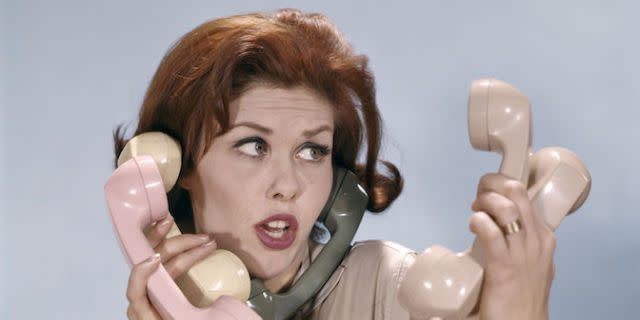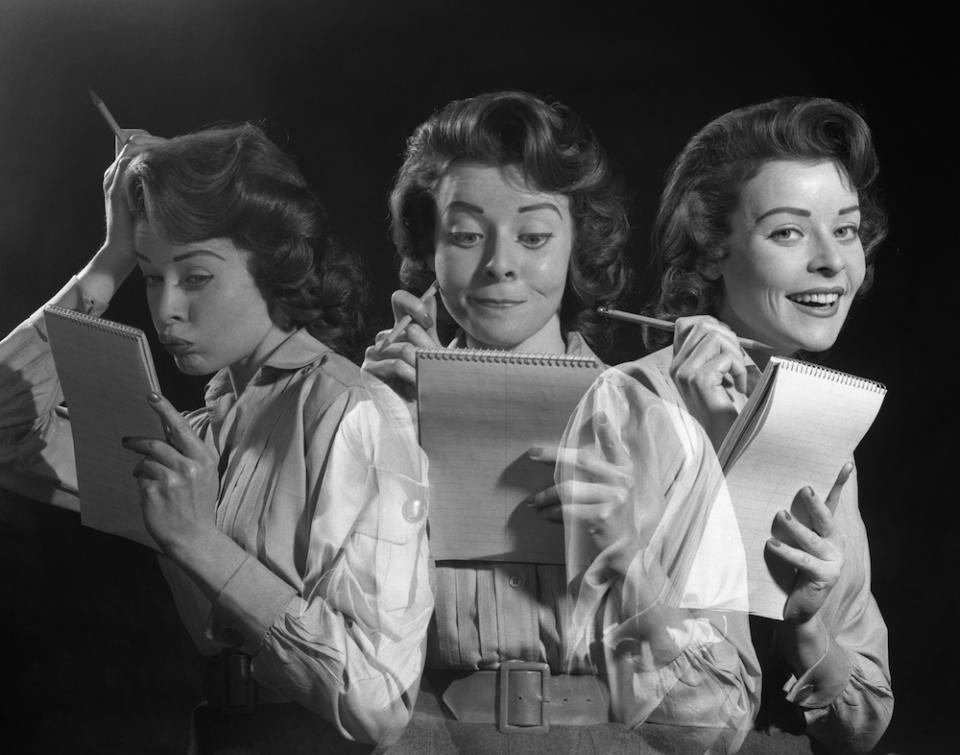I'm a Single Woman and I'm Fed Up With Emotional Labor, Too

The other week, as I was calmly and patiently explaining to my friend, an adult male, that the problem wasn't that he couldn't hang out the evening before, but rather that he'd never told me that our meet-up wasn't gonna happen, I suddenly realized: This is emotional labor.
A few nights later, when I was Googling around, trying to figure out which train a different male friend could take to meet us on our group getaway upstate? That was emotional labor, too.
When, in the days after Gemma Hartley's brilliant Harper's Bazaar essay on emotional labor went viral, I mentioned it to another guy friend - one who works in media and reads the internet all damn day - I had to pause to explain the concept, because he'd never even heard of it. I hid my annoyance as I brought him up to speed. Because you know how it goes: Emit a whiff of frustration, you're a naggy, hysterical female.
Yes, I'm single, but I'm really fed up with doing all the emotional labor in my relationships with men, too.
The Harper's Bazaar essay rocked, but it mostly echoed the cartoon that got us all thinking and talking about the household division of emotional labor in May. To recap, emotional labor (also called "the mental load") is the non-physical, largely thankless work that goes into running a family unit's lives. (The definition, for what it's worth, has shifted a bit from its original research usage, which focused on the work of self-regulating emotions.) Noticing, remembering, delegating, anticipating - these are all invisible but essential pieces of the running of a home. And as the French cartoonist Emma and essayist Hartley (and many other feminist writers) have pointed out, this stuff often unfairly falls to the women. Men have to be asked to pitch in; women are the ones with the imaginary chores wheel or to-do list inked into their brains.
I've read these pieces and thought, "My god, the injustice! I am filled with sympathy for my married friends." But why is the mental load discussed only in the context of married couples sharing household chores? I don't co-manage a home with a man, sure, but I do far more than my fair share of emotional labor in my relationships with male friends, coworkers, and dates. That's not sympathy blazing inside me like heartburn; that's empathy.
I don't co-manage a home with a man, sure, but I do far more than my fair share of emotional labor in my relationships with male friends, coworkers, and dates.
Single women do so f*cking much, and we're excluded from this conversation. I don't have brothers, but one friend pointed out she's always the one reminding hers of a parent's birthday or anniversary. In my coed friend group, it's always the women organizing the group gifts and setting up Doodles for future getaways. We're unfairly saddled with it, but not allowed to talk about it. And keeping it in is, if anything, another infuriating drain on my energy.
Of course, there's much less emotional labor to be done when you don't have kids. Absolutely, if you have children - tiny sentient beings surrounded by a cloud of to-dos and little ability to pull it off themselves - both you and your partner have more going on. But I'm not sure the same is true of couples who are simply cohabiting; if anything, now you have two minds to share the burden of RSVP'ing to a wedding invitation, researching hotels, and figuring out which flight time is best. But while theoretically a couple's average, per-person emotional labor load drops, in practice, the woman often gets stuck doing the lion's share.
There seems to be an idea floating around amidst non-single people that we uncoupled folks have it easy. Flicking through Tinder on my phone or begging for first-date details, these friends sigh dreamily and comment on how lucky I am to be so free, to never know where the night will take me, to have romance and butterflies instead of an overbearing mother-in-law and unbridled farts ahead of me.
But here's what coupled-up people don't understand: Certain things are just expected of single women from everybody. It's assumed they'll be the ones to stay late and put out fires when something goes wrong at work (calmly, without complaining, and while reassuring everyone around them) while those with families clock out at 4:59. (I'm sorry, is the LCD Soundsystem show I have tickets for truly a less valid excuse than your kid's talent show?) It's almost a given that the unmarried adult will drop everything to care for aging family members, which obviously involves labor of the physical and emotional kind. And it's up to us singletons to maintain relationships with both married and single friends: One study demonstrated that, compared to single people, married ones are less likely to be in touch with their family and to support, help, and socialize with neighbors and friends. Maybe, just maybe, we're not the frolicking, lazy, navel-gazing, liberated free spirits we seem to be.

Which is not meant as a woe-is-me, being-single-sucks bitchfest. I love my social life, with its patchwork of dates and cliques and work friends and professional contacts and travel and all the things that keep me far from lonely. But my point is this: Now that single women outnumber married ones in the U.S., we need to broaden the context of emotional labor outside the hetero white-picket-fence-and-2.2-kids-box to include the heavy nonphysical lifting all women do for the men in their lives. Wives and mothers aren't the only unfair bearers of emotional labor these days, and, just like Hartley feels dismayed by the number of tasks that automatically fall into her purview, we single women are fed up, too.
Noticing that a female colleague's comment was ignored and repeating it with credit, a technique known as amplification: That's emotional labor. Arranging office happy hours: Yep, emotional labor, too. Explaining to the world why unmarried women can't be left out of this conversation: You see where this is going, and if you think you're tired of "whiny, self-obsessed snowflakes," just imagine how exhausted we feel.
We're tired of explaining shit we shouldn't have to. We're tired of screaming over and over and over until our throats are raw that women are people, that random men in the street really do tell us to smile, that our mere unchaperoned existence is not ever, not ever, the reason for an assault.
Maybe the stakes are lower for me than for my child-having friends; maybe my emotional load is my own damn fault, because I am, admittedly, the one researching train schedules and setting up Doodles and, unlike a mother remembering to schedule booster shots for her kid, nobody will die if I throw up my hands. But here, just as with married couples, socialization is working a bit like invisible handcuffs. I'm Midwestern and female, which is like scoring an automatic A+ in anticipating everyone's needs. That habit is hard to break. I'm trying to find the balance, to ask for help and to just walk away when something's truly not my problem. I could implore the men in my life to take on the bulk of certain nonphysical tasks. But to quote Hartley, "That's the point - I don't want to have to ask."
Follow Redbook on Facebook.
You Might Also Like


